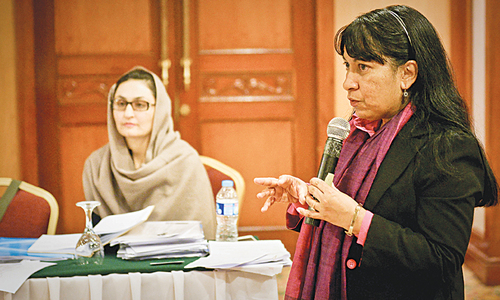ISLAMABAD: The United Nations High Commissioner for Refugees (UNHCR) says that the pace of return of Afghan refugees back home is expected to remain modest in 2018.
However, the UNHCR cannot reduce the impact that the general elections in Pakistan next year may have on Afghan refugees.
The ‘refugee affected and hosting areas (RAHA) programme, a key element of the ‘solutions strategy for Afghan refugees’ (SSAR), will continue to support host communities and promote peaceful coexistence. The SSAR is a multi-year regional framework that seeks solutions for Afghan refugees living in a protracted situation. It offers a comprehensive and integrated framework for joint interventions aimed at facilitating voluntary repatriation and sustainable reintegration, while at the same time providing assistance to host communities and countries.
Pakistan hosts more than 1.3 million registered Afghan refugees, with the number of refugees returning from the country declined from some 370,000 in 2016 to around 50,000 in the first three quarters of 2017.
In Pakistan, the UNHCR expects to disengage from its protection cluster responsibilities in relation to Internally Displaced Persons (IDPs) in the Federally Administered Tribal Areas and Khyber Pakhtunkhwa by 2018, after building the capacity of the authorities.
The UN refugee agency says that the protracted Afghan refugee situations in Iran and Pakistan require long-term solutions, with a focus on the creation of conditions conducive to voluntary repatriation to Afghanistan and support for refugee-hosting communities.
The UNHCR has launched ‘Appeal 2018-2019’ which lays out the financial resources that will be required for the agency’s programme to protect and improve the lives of 68 million people of concern. The appeal presents the proposed budgets for the 2018-2019 - $7.508 billion, and $7.352 billion for 2018 and 2019, respectively.
UNHCR says in mid-2017, a delegation of 160 Afghan refugees travelled from Pakistan to Afghanistan to advocate for measures to be taken to ensure return is sustainable, including in relation to land, employment, shelter, health and education. In 2018, data from the UNHCR’s protection-based monitoring in Afghanistan will continue to help address protection issues in the country, support the transition between humanitarian assistance and development work, and inform government-led reintegration activities.
The Asia and the Pacific region, in 2018, accounts for the majority of UNHCR’s global budget for statelessness, largely due to the situation in Myanmar. However, the refugee programme remains the most important aspect of UNHCR’s work, amounting to $329 million, or 67 per cent of the region’s funding requirements.
Published in Dawn, November 17th, 2017















































Dear visitor, the comments section is undergoing an overhaul and will return soon.